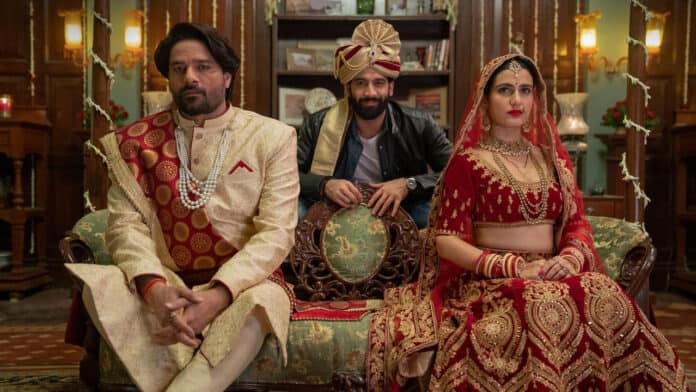Rating: 4/5
With tons of films dealing with convoluted love stories coming out each year, anthology film ‘Ajeeb Daastaans’ on Netflix, at first glance, doesn’t really provide a breath of fresh air.
Directors Shashank Khaitaan, Raj Mehta, Neeraj Ghaywan and Kayoze Irani come together to contribute a short film each. After similar feats attempted by the previously released anthology films such as ‘Lust Stories’, this film strikes the right chords.
Story
Majnu: The opening short is ‘Majnu’ directed by Shashank Khaitaan. ‘Majnu’ portrays a loveless marriage between influential goon cum businessman Babloo (Jaideep Ahlawat) and daughter of politician Lipakshi (Fatima Sana Shaikh).
Raj Kumar (Armaan Ralhan) son of Babloo’s driver, returns to India with a well-paying job to his name, to get hired by Babloo to handle his affairs.
There are multiple twists and complications that arise, with Lipakshi being attracted to Raj, and Babloo revealing his underlying insecurities. In the end, much of Babloo’s material stability is destroyed, but his rather bitter marriage is healed.
This short demarcates the various institutions that are meant to withhold affection between individuals, and separates them from what is love itself.
While the first short portrays how love blooms away from the forcible structures of society, the further films illustrate how love is inseparable from the myriad facets of class and caste, and prevalent economic systems.
Geeli Puchhi: Neeraj Ghaywan’s ‘Geeli Puchhi’ surrounds a unique relationship between Dalit factory worker Bharati (Konkona Sen Sharma) and Priya (Aditi Rao Hydari) who is recruited in a much higher position in the same factory.
While exploring themes of lesbianism, caste hegemony and their areas of intersection, ‘Geeli Puchhi’ doesn’t gloss over them as mere lip-service.
The short shows nascent love being squandered in individualist India, where the realities of caste still haunt the majority.
Khilauna: ‘Khilauna’ by Raj Mehta draws contrast between the happily married couples living on the wealthier side of the fence, with the hustling romance between two working-class folks (Nushrat Barucha and Abhishek Banerjee).
While it almost satirises the superficial prudishness that surrounds upper-class family life, it is too grim to be comic, with scenes of numbing violence.
Ankahi: “Your lips can always lie but your eyes always tell the truth,” says a character in Kayoze Irani’s ‘Ankahi’ the final film of the lot.
Natasha (Shefali Shah) gets into daily brawls with her husband over his reluctance to learn the sign language which is required to communicate with their daughter.
In her visit to an art gallery, Natasha meets a deaf photographer (Manav Kaul). His presence, and implication of love without spoken words, empowers Natasha as she regains the confidence that she lost to her husband’s words of anger.
Eventually, however, Natasha returns to her family life, leaving behind the deaf man.
Performance
The apt performance is nothing unexpected from the ensemble cast of the film. Jaideep Ahlawat puts up the perfect big show, with a shade of sorrow and loneliness subtle tucked under his brows.
Konkona Sen Sharma and Aditi Rao Hydari create a chemistry that is impeccable, yet not unevenly away from the realities of the setting.
Alongside the powerful performances of Nushrat Barucha and Abhishek Banerjee, what’s commendable is the performance of child actor Inayat Verma.
Manav Kaul and Shefali Shah pull of the most emotionally incisive scenes, where their romance is entirely alluded to through sign language and no words. They blend in perfectly and the subtlety speaks volumes.
Positives
‘Ajeeb Daastaans’ presents the picture of love and relationships, that is widely missing from our mainstream film discourse. The film reaffirms the idea that love isn’t all rosebuds and celebrations, as is often portrayed.
Each film is crisp and gets straight to the point. Before one can be too sure, the short concludes with striking imagery. The film succeeds in getting its point across, without appearing preachy or agenda-driven.
The performances are only boosted by the attention to setting and cinematography that is purported by the film shot largely in Lucknow.
Negatives
The rigid structure of the anthology film sometimes seems to limit the possibilities. The fact that each short needs to conclude short and sweet, takes away the scope for further and deeper explorations of the themes.
Worth it?
‘Ajeeb Dastaans’ is most certainly worth the watch. Its audience is not limited to only those who enjoy the romance and love genres, but anybody who’s ready to give a try to a new spin to underexplored ideas.
Also Read: Love and Monsters review: Predictable flick with a surprising amount of heart

